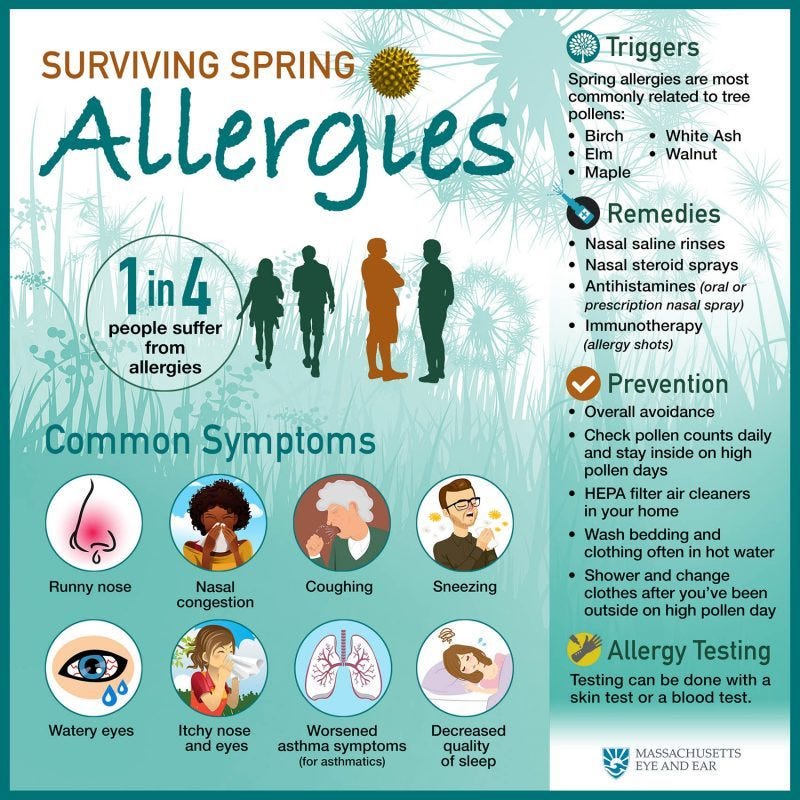Seasonal Allergies and Nutrition
Hello, Friend! Happy Tuesday!
I sincerely hope you’re enjoying this blog! I imagine you’re learning new and insightful things about nutrition, or, at the very least, are entertained by my thoughts! If you would like to help support this newsletter, please consider becoming a paid subscriber for just $5 per month. This contribution makes a tremendous difference.
If you aren’t already subscribed, or would like to upgrade your subscription, you can do so below. As always, thank you for reading!
Welcome to “Pollen Covering Your Car” Season! And a collective “Bless you” to all who are currently sneezing/suffering from seasonal allergies right now. I’m right there with you.
Yesterday we were out on a walk and there was this row of really pretty flowering bushes. As we walked by, I could smell them a bit but thought I’d get a little closer to get a better smell… then stopped myself and decided against it… because putting my already-suffering-from-allergies face into a plant might not help!
If you’re someone who experiences seasonal allergies, they may be unavoidable. BUT, can we decrease our symptoms with our food choices/non-medication options? Maybe.
This topic piqued my interest because I’m currently breastfeeding and am trying not to take any medications that aren’t completely necessary. Yes, I’m aware that there are some over-the-counter allergy meds that are okay to take when breastfeeding, and I’ll take them if I get desperate, I just don’t want to if I don’t have to.
So, if you’re like me, here are some things to consider:
Certain nutrients, like as antioxidants and omega-3s, have anti-inflammatory properties. Allergic reactions involve an inflammatory response in the body, so consuming foods rich in these nutrients may help reduce inflammation and alleviate allergy symptoms. You know, like your blueberries, fatty fishes, flaxseeds, chia seeds, and walnuts.
Vitamin C is known for its immune-boosting properties. It acts as a natural antihistamine and can help reduce the severity of allergic reactions. Citrus fruits, strawberries, kiwi, and leafy green vegetables are good sources of vitamin C. (See this study)
Probiotics are beneficial bacteria that can help maintain a healthy gut microbiome. Some studies suggest that a healthy gut microbiome may play a role in reducing the risk and severity of allergies. These can be found in fermented foods like yogurt, kefir, sauerkraut, and kimchi.
You might also check out non-food products like saline nasal sprays and eye drops. These certainly won’t “heal” you, but may make symptoms more manageable.
Here’s an infographic from Massachusetts Eye and Ear to check out as well:
On the other hand, certain foods may exacerbate allergy symptoms in some individuals. These foods can vary depending on the person, but common culprits include dairy products, gluten, processed foods, and foods high in histamine (such as aged cheeses, fermented foods, and cured meats).
Coffee, sugar, and alcohol can also make allergies worse for some. Spicy foods get mixed reviews… for some it can help clear out sinuses and mucus… for others the increase in spice can make eyes and noses more drippy. (Yes, “drippy” is the medical term…) Anyway, see if symptoms increase after eating certain things and moderate their intake during high-allergen times.
With all of this being said, this post is NOT a substitution for medication or medical advice. You should not discontinue use of any prescribed medication or anything like that, I’m just sharing my own recent research on the topic.
Are there other non-medication strategies you use for managing seasonal allergies? If so, please share in the comments or send me an email at sara@nutritionforlifeproject.com!
Best of luck making it through the next few days/weeks! Hang in there!
As always, thank you for reading!
xoxo,
Sara





